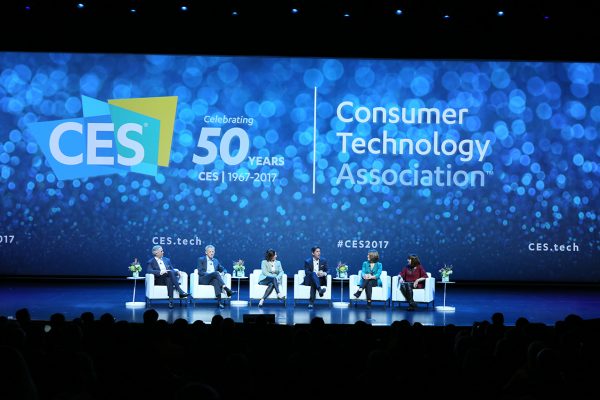Post 2 of 2 related to CES 2017. Post 1.
Companies at the Consumer Electronics Show (CES) 2017 demonstrated how lots of industries are shifting from providing a product or service to providing an experience which fulfills a need or solves a problem. Living sustainably is increasingly the collective need/problem, compelling more big companies to maximize the societal value toward which CECP works. Corporate purposes, their very raisons d’être, continue to morph to reflect this shift. This is particularly evident among CECP’s companies on the scale of the Fortune 500. E.g., the customer doesn’t want a drill, she wants a 3-cm hole. She doesn’t want a car, she wants to get from A to B. She doesn’t want a Peleton stationary bike, she wants to exercise flexibly, live, and connected. Ford constantly asks itself, “how to make people’s lives better by helping them move,” not about cars.
One colleague asked me how pervasive the shift in purpose is. Don’t take my word for it. Companies speak for themselves; from fast-moving consumer goods to insurance to infrastructure, from products to services, and from the US to Japan to India. Their word cloud would look like this: making lives better, making the world a better place, doing right, inclusivity of all people, higher purpose, long-term value, sustainable living, what matters to people, prosperity, future, dreams.
Google’s mission (USA): “To organize the world’s information and make it universally accessible and useful,” with its motto: “Don’t be evil.” Google’s parent Alphabet Inc. adopted “Do the right thing” in its Code of Conduct.
Ford’s vision (USA): “To make people’s lives better through automotive and mobility leadership.” On the other side of the world, competitor Toyota’s vision (Japan) is similar: To “lead the way to the future of mobility, enriching lives around the world with the safest and most responsible ways of moving people.”
PepsiCo’s focus (USA): “Deliver sustainable long-term growth while leaving a positive impact on society and the environment – what we call Performance with Purpose.”
Swiss Re’s vision (Switzerland): “We make the world more resilient.”
Bayer’s mission (Germany): “Science for a better life.”
Unilever’s vision (UK): “To make sustainable living commonplace.” Competitor P&G’s purpose (USA) is to improve lives too in its more old-school, industrial lexicon: To “provide branded products and services of superior quality and value that improve the lives of the world’s consumers.”
Samsung’s philosophy (South Korea): “To devote our talent and technology to creating superior products and services that contribute to a better global society.”
Tata Group’s mission (India): “To improve the quality of life of the communities we serve globally through long-term stakeholder value creation based on Leadership with Trust.”
LafargeHolcim’s mission (Switzerland): “To provide what really matters to our customers and end-users.”
Lend Lease’s mission (Australia): To “create and deliver innovative and sustainable property and infrastructure solutions for future generations.”
Walmart’s mission (USA): “To save people money so they can live better.”
Alibaba’s mission (China): “To make it easy to do business anywhere.”
Fujitsu Group’s vision (Japan): “To contribute to the creation of a networked society that is rewarding and secure, bringing about a prosperous future that fulfills the dreams of people throughout the world.”
Takeda Pharmaceutical’s mission (Japan): “To strive towards better health and a brighter future for people worldwide through leading innovation in medicine.”
L’Oréal’s mission (France): “Cosmetic innovation for all.”
Telstra’s purpose (Australia): “To create a brilliant connected future for everyone.”
Grupo Santander’s purpose (Spain): “Helping people and businesses prosper.”
Vale’s vision (Brazil): “To transform natural resources into prosperity and sustainable development.” Its mission: “To be the number one global natural resources company in creating long term value, through excellence and passion for people and the planet.”
Lukoil’s mission (Russia): “To make the energy of natural resources serve the interests of mankind, to efficiently and responsibly develop the unique hydrocarbon fields entrusted to us by providing Company growth, the wellbeing of its employees and community at large.”
Safaricom’s mission (Kenya): “Transforming the lives of our customers, communities and colleagues.”
Itaú Unibanco’s vision (Brazil): “Be the leading bank in sustainable performance and customer satisfaction.”
The list of awesome, noble, transformative corporate purposes continues beyond these companies. Through them, companies acknowledge and undertake to rise to our new and no less awesome, noble, and transformative expectations of them. All will fail to live up to their purposes at times, like Samsung does as I write. Nonetheless, they bravely move forward with purpose. This is business leadership.
Such leadership likely has to do with the coming-of-age of millennials, who are finally a majority of the workforce; I hear business leaders like these mention them daily. In numerous surveys, millennials indicated that corporate purpose matters to them when taking employment, investment, protest, and purchasing decisions. CEOs surveyed by CECP revealed that the top benefit their companies get out of societal investment is employee engagement.
Notably, corporate purposes have held up well vis-à-vis the investor scrutiny, activism, and demands of transparency, governance, and (short-term) financial returns that all the publicly traded companies above face. If they have done it, other companies will shift too. Undeniably, if we are to prosper on earth together in peace, humans must live sustainably. Today’s and tomorrow’s most valued and valuable companies are those that help us toward that collective purpose. Societal value is now business as usual.


